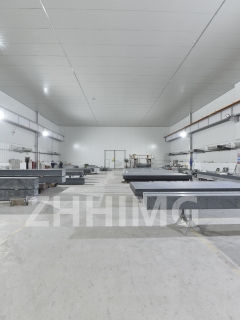Automation technology products have become an integral part of modern industrial processes. From small-scale operations to large-scale enterprises, automation technology plays a key role in improving efficiency, productivity, and quality. One critical component of automation technology products is the machine base, which provides the foundation for the equipment. In this article, we will discuss some common defects of granite machine bases used in automation technology products and suggest ways of addressing them.
Granite is a popular choice for machine bases due to its high stiffness, low thermal expansion, and vibration dampening properties. However, like all materials, granite has its limitations. One of the main drawbacks of granite is that it is susceptible to warping and cracking under high stress conditions.
One of the most common defects in granite machine bases is bowing. A bowing machine base occurs when the stress on one side of the base is greater than the other, causing the base to curve or warp. This can result in inaccurate positioning of the equipment, which can lead to errors in production processes. To address this defect, it is important to ensure that the stresses on the machine base are evenly distributed. This can be achieved by proper mounting and calibration of the equipment, as well as regular maintenance and inspection of the machine base.
Another common defect in granite machine bases is cracking. Cracking can be caused by a variety of factors, including excessive stress, thermal shock, or improper handling during installation. Cracks can compromise the integrity of the machine base, leading to instability and misalignment of the equipment. To prevent cracking, it is important to use high-quality granite with minimal impurities and to avoid exposing the base to sudden changes in temperature or humidity.
A third defect in granite machine bases is porosity. Porosity occurs when the granite has holes or gaps in its structure, which can lead to uneven distribution of stress and vibration damping. This can result in inconsistent performance of the equipment and reduced accuracy. To address porosity, it is important to use high-quality granite with minimal porosity and to ensure proper sealing and coating of the machine base to fill any gaps.
In conclusion, while granite machine bases have many advantages, they are not immune to defects. Proper installation, calibration, and maintenance are key to preventing these defects and ensuring optimal performance of automation technology products. By addressing these defects and taking proactive measures, we can ensure that automation technology continues to play a vital role in modern industrial processes.
Post time: Jan-03-2024

